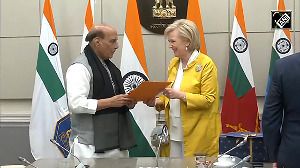On April 30, S S Kohli of Punjab National Bank, M Venugopalan of Bank of India and B D Narang of Oriental Bank of Commerce retired as chairman of their respective banks.
Kohli announced a healthy 27 per cent jump in Punjab National Bank's bottomline in 2005-06 at Rs 1,410 crore (Rs 14.1 billion), M Venugopalan's swan song was quite dismal.
Bank of India's net profit fell by 66 per cent for the year. Oriental Bank of Commerce, which has taken over the beleaguered Global Trust Bank, is yet to declare its annual results.
Venugopalan is set to take charge at the Kerala-based Federal Bank in early May. Post retirement plans of Kohli and Narang are not immediately known.
The chiefs of these three banks have left at a time when the banking system is gearing up to cope with rising rates. In 2002-03 and 2003-04, all banks had enjoyed windfall profits by trading in government bonds as prices shot up and interest rates softened.
But from mid 2004-05 as the interest rate cycle started to turn, banks felt the heat and treasuries lost their sheen. Bankers have had to turn to their core lending business to make profits.
Most of them shifted large chunks of their bond portfolios to shield themselves from further interest rate shocks. Banking stocks tumbled after the RBI announced a hike in short-term rate.
Punjab National Bank's share price is currently trading at Rs 346.20, a 12.6 per cent discount to the price of the allotment of its recent second public issue, which was Rs 390.
Oriental Bank of Commerce's scrip is trading at a comparatively better level of Rs 273.60. It closed its second public issue on April 29 with the price band at Rs 235-260.
Bank of India may hit the capital markets in this fiscal with M Balachandran at its helm.
Balachandran, currently executive director at the bank, is tipped to take charge at the bank. K N Prithviraj, executive director of United Bank of India, is slated to take over, as OBC chief, while SC Gupta, chairman of Indian Overseas Bank, will step in Kohli's shoes.





 © 2025
© 2025